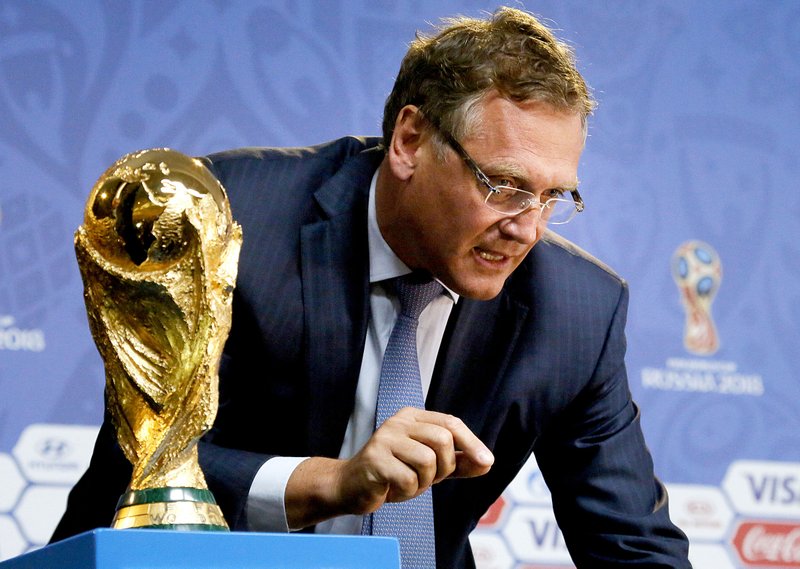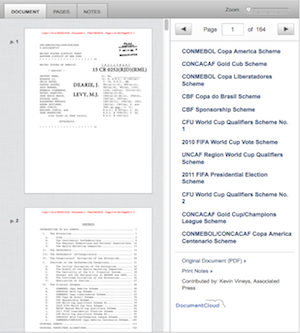The top deputy to FIFA President Sepp Blatter said Friday that he expected his career at world soccer's governing body to end alongside his boss's when the special election for a new leader is held in February.
Jerome Valcke, who has been the secretary-general of the soccer world governing body and Blatter's trusted executive since 2007, has resisted calls to resign in light of allegations of corruption at the organization, but he said Friday that he anticipated FIFA's next president would name a new secretary-general.
"If I would be the next FIFA president, I would take a new general secretary, so yes, whoever becomes president should have a new general secretary because it is the most important relationship for any organization," said Valcke, speaking in St. Petersburg, Russia, at a news conference before today's draw for the 2018 World Cup qualifying tournament.
Asked what he would do when he leaves FIFA, Valcke, 54, said that "what I want to do with my life is just a question about me and myself."
Neither Valcke nor Blatter have been directly charged in investigations by U.S. and Swiss authorities into graft at FIFA, but, as the governing body's two top officials, they are under scrutiny. Valcke has been linked to a wire transfer of $10 million that the Justice Department considered suspicious and believes was related to the bidding for the 2010 World Cup hosting rights.
There have also been persistent questions and criticism from FIFA's corporate partners. Three key sponsors -- Coca-Cola, Visa and McDonald's -- have been particularly vocal, and Valcke said Friday that FIFA would hold a meeting next month with representatives from those companies to fully explain what FIFA is doing to overhaul itself.
Fourteen soccer officials and sports marketing executives have been indicted in the United States as part of the investigation there, while the Swiss inquiry is examining potential improprieties related to the awarding of the 2018 and 2022 World Cup hosting rights. Valcke acknowledged that FIFA's current state of affairs had made it difficult to complete new agreements with sponsors.
"The current situation doesn't help to finalize any new agreements -- that is a fact," Valcke said.
FIFA has not signed any major new sponsors since the 2014 World Cup -- a noticeable gap -- and while Valcke said negotiations were being held with two companies that he did not name, he conceded that it was unlikely that any deals would be announced before FIFA'spresidential election Feb. 26, 2016.
FIFA's executive committee has announced some of the changes it hopes to implement, although it also said the overhaul would be led by its own ethics committee, a move that some governance experts have panned because it would not be truly independent.
Blatter has said repeatedly that his main goal before leaving office after serving nine months of his fifth four-year term is to see FIFA make significant changes to the way it operates.
Still, many fans and soccer officials outside FIFA believe no meaningful change is possible without a significant overhaul of the organization's structure. That, of course, includes its leadership, and Blatter said at a news conference earlier this week that external pressure had played a significant part in his decision to call for a special election.
Valcke, the administrative head of FIFA, has been more confrontational in his few meetings with journalists since the investigations became known publicly.
He initially denied having any connection to a $10 million wire transfer that FIFA sent to the Caribbean football association on behalf of the South African federation. U.S. authorities said they believe that transfer was a bribe.
In an email to The New York Times, Valcke said, in part, "I have not authorized such payment." He backtracked when a letter describing the transaction, with his signature, was later obtained by the United Kingdom's Press Association.
On Friday, Valcke reiterated his denial of wrongdoing, saying that as an administrator he was only carrying out directives as ordered by the executive committee and by other FIFA leaders.
"You are asking me if I am responsible for what has happened," he said. "I don't think I am really involved. I don't think I am of anything to do in this case."
He added that he does not have any concerns about traveling abroad, unlike Blatter, who has said he does not want to "take the risk" of leaving Switzerland because of the investigations, presumably because of concerns about arrest and extradition.
A Section on 07/25/2015


